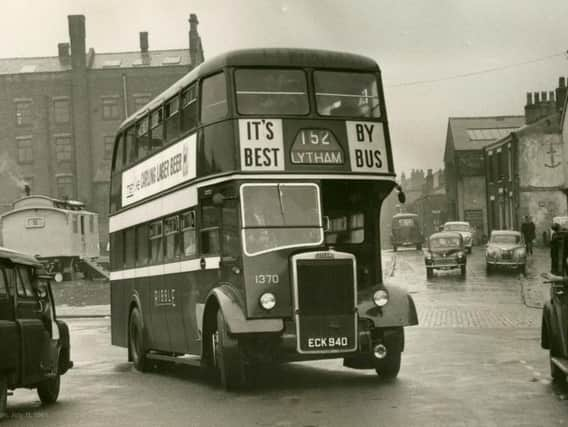Ride through history of Preston's buses


The name of Preston’s river was chosen in 1919 as the title of a bus company whose territory eventually covered much of old Lancashire as well as parts of the fondly remembered counties of Westmorland and Cumberland. It developed from a small business started by Mr J Hodson of Gregson Lane when in 1910 he started running a service to and from Preston using open topped double deck buses.Ribble Motor Services grew rapidly and such was its confidence that a new head office was opened in 1937 at Frenchwood Avenue, Preston, and the original building is still there. Many of the services operated by its red buses were centred on Tithebarn Street Bus Station (inset)which was built in 1928 and ceased to be used in 1969 with the opening of Preston’s current bus station, of such fame and importance that it is now a listed building noted by architects around the world for its Brutalist style. Blackpool was a popular destination, and in the 1930s Ribble’s routes linked the cotton towns of Burnley, Blackburn, Chorley and Bolton with the seaside by providing direct bus services while those travelling from other Lancashire mill towns had to change buses in Preston. In the early 1950s, the company’s charismatic general manager, Horace Bottomley, changed all of this when he created through services by linking routes between the Fylde coast and Preston with separate services to Burnley, Blackburn, Rochdale, Chorley, Leyland and Wigan.Before the Second World War, Ribble competed fiercely between Preston and Blackpool with a much smaller Preston concern, Scout Motor Services, which had its origins in a business set up by James Watkinson in 1919. Scout’s ivory, mauve and black liveried buses ran from a small bus station in Starchhouse Square. The square was also used by other local bus operators, Bamber Bridge Motor Services (BBMS) and Viking Motors. International conflict prompted an end to local hostilities, and a wartime agreement survived into peacetime with Ribble and Scout working together in providing a coordinated timetable linking the two towns. A return ticket purchased on a Ribble bus could be used on a Scout bus on the journey back. Ribble needed Scout’s cooperation in delivering Horace Bottomley’s vision, and thus, the two companies shared several cross-Preston services meaning that Scout buses could be seen well away from the company’s traditional Fylde coast territory in Blackburn, Burnley and Rochdale, while they appeared for the first in Lytham. Sadly, the Scout company lost its independence in 1961 when it sold out to its larger neighbour. Ribble had already taken over Viking in 1952 and BBMS followed suit in 1967.The dream ended in 1965 when most of the links were broken. Reliability was a real problem and it was difficult for passengers in Rochdale to accept that their buses were delayed because of summertime traffic congestion problems at Ashton-on-Ribble. Conversely, on a cold, dry yet sunny winter’s day, passengers were unimpressed at the news that snow on the moors near Rochdale meant that there were no buses for residents of Weeton.Another dimension was time. The linked services had frequent stops, and meandering around Kirkham, Wrea Green and Weeton added to the time taken for a journey. Ribble also developed an extensive network of direct local express services and these provided much quicker and more reliable trips to the coast from south and east Lancashire. Ribble became part of the State owned National Bus Company in 1969 and its distinctive livery was replaced by what was described as poppy red. In preparation for privatisation and deregulation in 1986 Ribble was stripped of its northern and Merseyside territories and was therefore a shadow of its former self during its glory days. Ribble subsequently became part of the Stagecoach Group which, ironically, has reunited much of Ribble’s old territory by taking over bus services in Cumbria and setting up a new operation in Merseyside. Regrettably the old Ribble company and its familiar red buses are a distant yet proud memory.